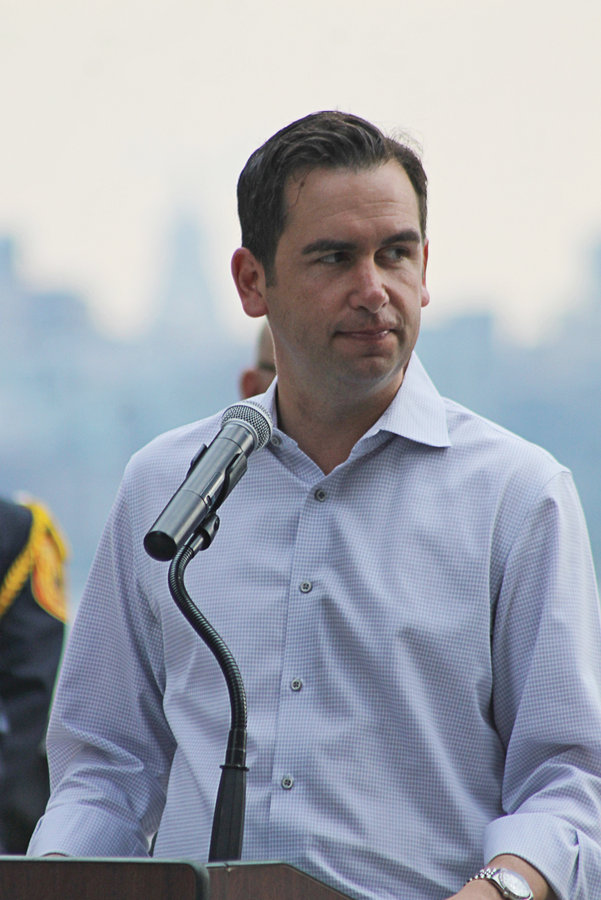With a host of potential rivals planning to run for mayor next year if Mayor Steven Fulop runs for governor, Fulop – who may end up seeking reelection – last week talked about his first three years in office.
In the run up to the 2017 municipal election cycle, Fulop’s political opponents have questioned his methods of balancing the municipal budget, awarding tax abatements, and approving development in the city.
“The city is leading the state in every positive metric.” – Steven Fulop
____________
But Fulop believes his formula for success works, and that the city has begun to grow and thrive, largely because of policies enacted since he became mayor.
“The city is leading the state in every positive metric,” Fulop said during an interview, “and this administration and the residents have a lot to be proud of.”
His defense of his record comes at a time when Fulop may be seeking the Democratic nomination for governor, and a few months ahead of a public referendum that could alter the political future of Jersey City.
Voters will decide this fall if municipal elections will be moved from next May to next November, putting local candidates on the same ballot as candidates for county, state, and federal positions and for the local Board of Education.
The change would allow Fulop to run in the Democratic primary for governor in June and, if unsuccessful, still seek reelection in November.
By defending his record against candidates already seeking to replace him, Fulop has set the tone for the mayoral election over a year before anyone actually votes.
“We haven’t had a tax increase in three years,” Fulop said. “And by all indications this city is moving in the right direction. Jersey City is one of the best places to live in the country.”
He said the city has seen an explosion in job growth and development, and many of the new projects are away from the glitzy environs along the Hudson waterfront.
“This is the first time that’s happened in years,” he said.
But the successes, he said, go beyond economics. He said his administration deserves credit for some significant social changes, too, like providing health benefits to transgendered city employees and establishing a paid sick leave policy.
Some critics have questioned the lack of maintenance in city parks, particularly small parks. As Fulop recently oversaw the ceremony opening of Berry Lane Park – the largest in the city – he proposed establishing a small tax to develop a trust fund to upgrade old parks and develop new open spaces.
A new resident of Jersey City Heights, Fulop said the city has seen a cultural expansion as well, becoming a place of ethnic and other festivals, and a flowering of quality of life at a rate not seen in decades.
“Our mural and public art program is very popular,” he said. “Our Citi-Bike program, which is celebrating its first anniversary shortly, has dawn thousands of riders. We have expanded our cultural events. This is a very special place.”
Some battles still not won
This is not to say that his administration isn’t facing hurdles. This week, a Superior Court ruled against Jersey City’s requirement that developers who get tax abatements from the city use union labor and provide training opportunities for local workers.
“If a project wants subsidies from the city, then part of the give back is to use quality union labor,” he said.
The city does not require any project approved to use union labor, but only those that get city subsidies.
“We think we’re right, and we intend to appeal the court’s decision,” he said.
On the ballot this November is a proposal that would allow casino gambling outside Atlantic City for the first time in the state’s history.
Once a proponent of bringing a casino to Jersey City, Fulop has reconsidered.
“Do I think casino gambling should be allowed outside Atlantic City? I do, but I no longer think it will be a good fit for Jersey City.”
Fulop initially proposed the casino as a way to increase revenues and bring new jobs to Jersey City. But earlier this year, after having extensive conversations, in particular with leadership in Atlantic City, he reconsidered.
“Jersey City is very attractive already,” he said. “We do not need a casino to bring people, jobs or revenues here.”
But he said the final decision for allowing casinos to operate outside Atlantic City rests with the voters, not him.
Critics raised questions about the wisdom of stopping of a revaluation after he took office in July 2013. Fulop has always maintained that the process for selecting the company was flawed. Courts have ruled against this position, but the matter is still under appeal. This week, the City Council – under a new mandate from the state – approved bonding to pay for a new revaluation to take place over the next few months.
Fulop did receive good news this week. The State Supreme Court ruled against a school funding formula proposed by Gov. Christopher Christie that could have drastically cut aid to districts like Jersey City and other distressed districts that are referred to as Abbott Districts.
“We have said all along that Chris Christie’s education plan is unconstitutional and is an attack on urban communities in the poorest of school districts,” Fulop said. “The state’s 31 Abbott districts were established to ensure that all New Jersey children receive equal education and any change to that would threaten the educational progress being made in places like Jersey City and Newark.”
Al Sullivan may be reached at asullivan@hudsonreporter.com.
